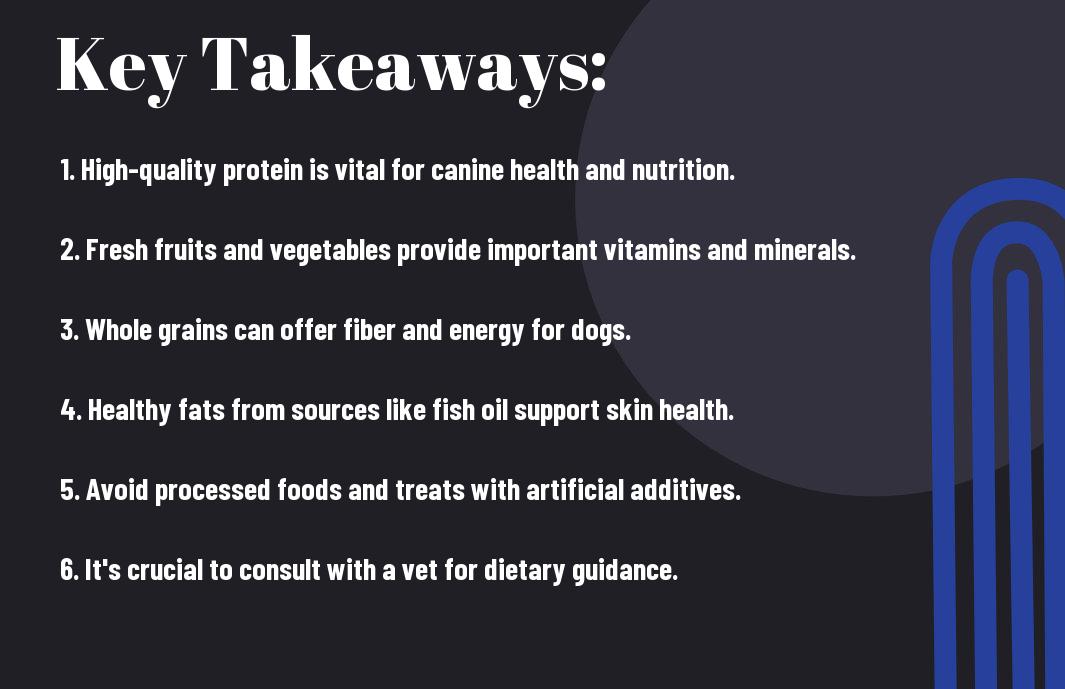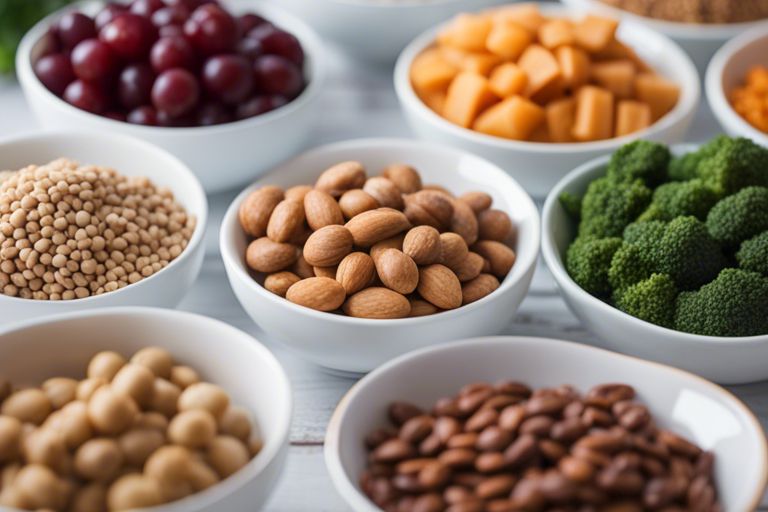Many of us consider our furry companions as part of the family, so it’s crucial to provide them with the best nutrition. Just as we meticulously choose what goes into our own bodies, we should extend the same care to our four-legged friends. From kibble to homemade meals, the options for feeding our dogs are vast and varied. In this article, we will probe into the world of canine nutrition and explore what truly is the healthiest food for our beloved pets.
Key Takeaways:
- Quality over quantity: It’s important to focus on the quality of ingredients rather than just sheer quantity when choosing the healthiest food for your dog.
- Protein-rich diet: Dogs thrive on a diet rich in high-quality proteins, so look for dog foods with real meat as the first ingredient.
- Consult your vet: When in doubt, always consult your veterinarian to ensure that your dog is getting the proper nutrients and diet for their specific health needs.
Nutritional Basics
Macronutrients: Protein, Fat, and Carbohydrates
The foundation of a healthy diet for dogs lies in the balance of macronutrients, which includes protein, fat, and carbohydrates. Protein is crucial for building and repairing tissues, while fat provides energy and aids in the absorption of fat-soluble vitamins. Carbohydrates are a good source of energy and fiber, which helps in digestion.
Micronutrients: Vitamins and Minerals
Nutritional health for dogs also depends on micronutrients, such as vitamins and minerals, which are vital for various bodily functions. Vitamins like A, D, E, and K play vital roles in maintaining a dog’s health, while minerals like calcium, phosphorus, and potassium are necessary for bone health and muscle function.
Minerals are vital for maintaining a dog’s overall health and well-being. They help in the formation of bones, teeth, and blood cells, and also aid in various physiological processes. Ensuring the right balance of vitamins and minerals in your dog’s diet is crucial for their longevity and vitality.
The Importance of High-Quality Protein
Little do many pet owners realize the critical role that high-quality protein plays in their dog’s overall health and well-being. Protein is crucial for maintaining healthy muscles, tissues, organs, and fur. It also serves as a vital source of energy for your furry companion. When considering choosing the healthiest food for your dog, prioritizing high-quality protein should be at the top of your list.
Animal-Based Protein Sources: Meat, Poultry, and Fish
Sources of animal-based protein such as meat, poultry, and fish are highly digestible and contain all the crucial amino acids that dogs need to thrive. Meat sources like chicken, beef, and lamb are rich in protein and provide important nutrients like iron and zinc. Poultry such as turkey and duck are also excellent protein sources, while fish like salmon and whitefish offer omega-3 fatty acids that support skin and coat health.
Plant-Based Protein Sources: Legumes, Grains, and Vegetables
PlantBased options such as legumes (e.g., lentils, peas), grains (e.g., brown rice, quinoa), and vegetables (e.g., sweet potatoes, spinach) can also contribute to your dog’s protein intake. While these sources may not have as high of a protein content as animal-based sources, they can still provide crucial nutrients and fiber that support digestion and overall health.
This combination of animal-based and plant-based protein sources can offer a well-rounded diet for your dog, ensuring they receive a variety of nutrients to support their active lifestyle and overall well-being.
Fats and Oils: The Good, the Bad, and the Ugly
Keep in mind that not all fats are created equal when it comes to your furry friend’s diet. While fats are an imperative part of a dog’s diet, it’s important to distinguish between the good, the bad, and the ugly when it comes to the types of fats and oils you feed your canine companion.
Essential Fatty Acids: Omega-3 and Omega-6
Ugly fats can be detrimental to your dog’s health, leading to obesity and a range of other health issues. On the contrary, imperative fatty acids like Omega-3 and Omega-6 are crucial for your dog’s overall well-being. Omega-3 fatty acids, found in fish oils, can help reduce inflammation, improve skin and coat health, and support cognitive function. Omega-6 fatty acids, commonly found in plant oils, are important for healthy skin and coat as well.
Healthy Fats: Coconut Oil, Salmon Oil, and More
Any responsible pet owner knows that healthy fats like coconut oil and salmon oil can provide numerous benefits for their furry companions. Coconut oil is known for its antibacterial and antiviral properties, promoting skin health, aiding in digestion, and even contributing to weight loss. Salmon oil, rich in Omega-3 fatty acids, is excellent for promoting a shiny coat, reducing inflammation, and supporting heart health in dogs.
Acids play a critical role in maintaining your dog’s overall health and well-being. By incorporating the right types of fats and oils into your furry friend’s diet, you can help ensure they lead a long, healthy, and happy life.
Carbohydrates: Friend or Foe?
Not all carbohydrates are created equal when it comes to the health of our canine companions. While carbohydrates are an important source of energy for dogs, the type of carbohydrates they consume can make a significant difference in their overall well-being.
Complex Carbohydrates: Whole Grains, Fruits, and Vegetables
On the one hand, complex carbohydrates found in whole grains, fruits, and vegetables can be a valuable addition to a dog’s diet. These carbohydrates are rich in fiber, vitamins, and minerals that can support digestion and provide vital nutrients for your furry friend’s health.
Simple Carbohydrates: Sugars, Starches, and Fiber
Grains, such as wheat and corn, are often used as fillers in commercial dog foods. While these grains can provide energy, they may not offer the same nutritional benefits as whole grains, fruits, and vegetables. Additionally, some dogs may have sensitivities or allergies to certain grains, leading to digestive issues or other health problems.
Carbohydrates play a significant role in a dog’s diet, but it’s vital to choose the right sources. Opting for complex carbohydrates from whole grains, fruits, and vegetables can provide your furry friend with the necessary nutrients for a healthy and balanced diet.
Hydration and Digestion
The Role of Water in Canine Health
Water is a crucial component of a dog’s overall health and well-being. Just like humans, dogs require an adequate amount of water to maintain proper hydration levels. Dehydration in dogs can lead to a host of health issues, including kidney problems, urinary tract infections, and even heat stroke. As responsible pet owners, it’s necessary to ensure that our furry friends have access to fresh, clean water at all times, especially during hot weather or periods of increased physical activity.
Supporting Gut Health: Fiber and Probiotics
Supporting your dog’s gut health is necessary for their overall well-being. Fiber and probiotics play a crucial role in maintaining a healthy digestive system in dogs. Fiber helps regulate bowel movements and can aid in preventing constipation, while probiotics are beneficial bacteria that promote good digestive health. Including fiber-rich foods such as fruits, vegetables, and whole grains in your dog’s diet, as well as incorporating probiotic supplements, can help support a balanced gut microbiome and ensure optimal digestion.
The gut is often referred to as the “second brain” due to its significant impact on overall health. By nourishing your dog’s gut with the right combination of fiber and probiotics, you can help boost their immune system, improve nutrient absorption, and reduce digestive issues such as diarrhea and bloating. A healthy gut is key to a happy and thriving pup!
Food Allergies and Sensitivities
Many dog owners may not realize that their furry companions can suffer from food allergies and sensitivities, just like humans. Identifying these issues early on and managing them properly is crucial for the health and well-being of your beloved pet.
Common Allergens: Beef, Dairy, and Wheat
Wheat is a common allergen for dogs and can lead to symptoms like itching, gastrointestinal upset, and skin issues. Dairy products, such as milk and cheese, can also cause allergic reactions in some dogs. Beef is another common allergen that can trigger adverse reactions in sensitive dogs. If you suspect your dog may be allergic to these foods, it’s important to consult with your veterinarian for proper diagnosis and treatment.
Identifying and Managing Food Sensitivities
To identify and manage food sensitivities in dogs, it’s important to carefully monitor their diet and any associated symptoms. Keep a food diary to track what your dog eats and any reactions they may have. Elimination diets can also help pinpoint specific allergens causing issues. For instance, slowly introducing novel proteins like venison or fish can help determine if your dog has a sensitivity to common proteins like beef or chicken.
Summing up
With these considerations in mind, it’s clear that the healthiest food for dogs is one that is well-balanced, provides crucial nutrients, and is tailored to their individual needs. It’s important to discuss your dog’s diet with a veterinarian, choose high-quality dog food, and consider factors like age, breed, size, and activity level to ensure they are getting the best nutrition possible. For more information on how to choose the right food for your furry friend, check out the American Kennel Club’s guide on Best Dog Food: How to Know What’s Right for Your Dog.
FAQ
Q: What is the healthiest food for dogs?
A: The healthiest food for dogs is a well-balanced diet that includes high-quality protein sources, healthy fats, carbohydrates, vitamins, and minerals. Look for dog foods that list real meat as the first ingredient and avoid artificial additives and fillers.
Q: How important is protein in a dog’s diet?
A: Protein is important for a dog’s overall health and well-being. It helps build and repair tissues, supports a healthy immune system, and provides energy. Make sure your dog’s food contains enough high-quality protein sources like chicken, beef, or fish.
Q: Are carbohydrates necessary for dogs?
A: While dogs can survive without carbohydrates, they can be a good source of energy and fiber. Opt for whole grains like brown rice or oats instead of fillers like corn or wheat, which offer little nutritional value.
Q: What are some examples of healthy fats for dogs?
A: Healthy fats are important for your dog’s skin, coat, and overall health. Look for sources like fish oil, flaxseed oil, or chicken fat in your dog’s food. Avoid foods high in unhealthy fats like trans fats or saturated fats.
Q: How can I ensure my dog is getting all the necessary vitamins and minerals?
A: To ensure your dog is getting all the necessary vitamins and minerals, choose a high-quality dog food that is AAFCO-approved. You can also supplement your dog’s diet with fresh fruits and vegetables like carrots, sweet potatoes, or blueberries for added nutrition.
Are strawberries toxic for dogs
Demystifying Anal Gland Issues in Dogs: Your Comprehensive Guide from the American Kennel Club




